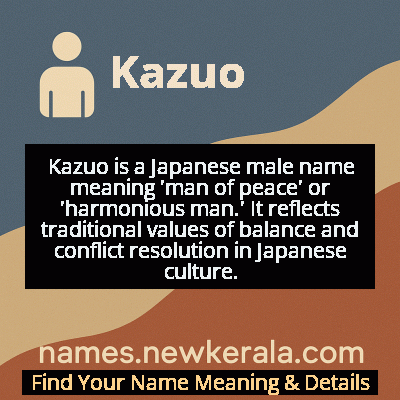Kazuo Name Meaning & Details
Origin, Popularity, Numerology Analysis & Name Meaning of Kazuo
Discover the origin, meaning, and cultural significance of the name KAZUO. Delve into its historical roots and explore the lasting impact it has had on communities and traditions.
Name
Kazuo
Gender
Male
Origin
Japanese
Lucky Number
2
Meaning of the Name - Kazuo
Kazuo is a Japanese male name meaning 'man of peace' or 'harmonious man.' It reflects traditional values of balance and conflict resolution in Japanese culture.
Kazuo - Complete Numerology Analysis
Your Numerology Number
Based on Pythagorean Numerology System
Ruling Planet
Moon
Positive Nature
Diplomatic, friendly, artistic, empathetic.
Negative Traits
Over-sensitive, moody, indecisive, prone to self-pity.
Lucky Colours
Green, cream, white.
Lucky Days
Monday.
Lucky Stones
Pearl, moonstone.
Harmony Numbers
1, 3, 4.
Best Suited Professions
Diplomats, mediators, caregivers, artists.
What People Like About You
Cooperative spirit, friendliness, artistic talent.
Famous People Named Kazuo
Kazuo Ishiguro
Novelist
Nobel Prize in Literature 2017
Kazuo Inamori
Entrepreneur
Founded Kyocera and KDDI corporations
Kazuo Ohno
Dancer
Pioneer of Butoh dance tradition
Kazuo Umezu
Manga Artist
Revolutionized horror manga genre
Name Variations & International Equivalents
Click on blue names to explore their detailed meanings. Gray names with will be available soon.
Cultural & Historical Significance
In the modern context, Kazuo represents a bridge between traditional Japanese values and contemporary society. During Japan's post-war reconstruction era, the name gained particular resonance as the nation reinvented itself as a peaceful economic power. The name carries connotations of reliability, wisdom, and the quiet strength that characterizes the ideal Japanese male archetype. It symbolizes the cultural memory of Japan's transformation from militarism to pacifism, making it more than just a personal identifier but a reflection of national identity and aspirations.
Extended Personality Analysis
People named Kazuo are generally associated with calm, thoughtful personalities and strong diplomatic skills. They tend to be natural peacemakers who excel at understanding multiple perspectives and finding common ground in conflicts. Their approach to life is typically methodical and considerate, with a preference for building consensus rather than imposing their will. This makes them excellent team players and trusted advisors who maintain emotional equilibrium even in stressful situations.
Beyond their peacemaking abilities, Kazuo's often possess deep emotional intelligence and intuitive understanding of human dynamics. They are usually reliable, principled individuals who value honesty and integrity, though they may sometimes be perceived as reserved or overly cautious in their decision-making. Their strength lies in their consistency and their ability to create stable, harmonious environments. While not typically flashy or attention-seeking, they earn respect through their steady presence and their commitment to fairness and justice in all their interactions.
Modern Usage & Popularity
In contemporary usage, Kazuo maintains a position as a respected traditional name in Japan, though its popularity has declined among newer generations who often prefer more modern or internationally influenced names. The name is now most commonly found among middle-aged and older Japanese men, reflecting its peak popularity during the mid-20th century. However, it continues to be chosen by parents who value cultural heritage and wish to honor traditional Japanese values of harmony and peace. Internationally, the prominence of figures like Nobel laureate Kazuo Ishiguro has helped maintain the name's global recognition and prestige, ensuring it remains a meaningful choice for those seeking a name with deep cultural roots and positive connotations.
Symbolic & Spiritual Meanings
Symbolically, Kazuo represents the powerful ideal of peace as an active, constructive force rather than mere absence of conflict. The name embodies the concept of harmonious balance across multiple dimensions - between tradition and modernity, individual and community, strength and gentleness. It symbolizes the wisdom of choosing dialogue over confrontation and the courage required to maintain principles during turbulent times. Metaphorically, Kazuo suggests a anchor point in stormy seas - a source of stability and calm that others can rely upon. The name also carries connotations of cultural continuity, representing the transmission of valued traditions and peaceful ideals from one generation to the next in an ever-changing world.

